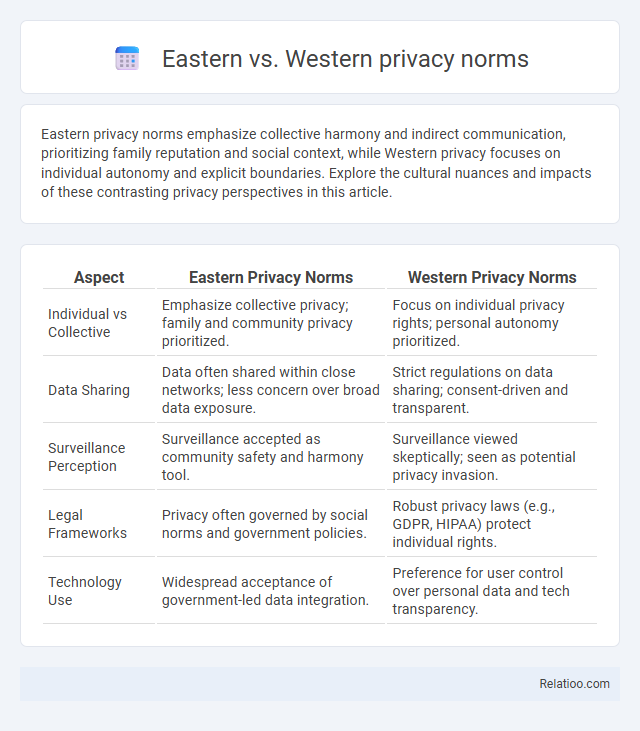Eastern privacy norms emphasize collective harmony and indirect communication, prioritizing family reputation and social context, while Western privacy focuses on individual autonomy and explicit boundaries. Explore the cultural nuances and impacts of these contrasting privacy perspectives in this article.
Table of Comparison
| Aspect | Eastern Privacy Norms | Western Privacy Norms |
|---|---|---|
| Individual vs Collective | Emphasize collective privacy; family and community privacy prioritized. | Focus on individual privacy rights; personal autonomy prioritized. |
| Data Sharing | Data often shared within close networks; less concern over broad data exposure. | Strict regulations on data sharing; consent-driven and transparent. |
| Surveillance Perception | Surveillance accepted as community safety and harmony tool. | Surveillance viewed skeptically; seen as potential privacy invasion. |
| Legal Frameworks | Privacy often governed by social norms and government policies. | Robust privacy laws (e.g., GDPR, HIPAA) protect individual rights. |
| Technology Use | Widespread acceptance of government-led data integration. | Preference for user control over personal data and tech transparency. |
Introduction to Privacy Norms: East vs West
Privacy norms in Eastern societies prioritize collective harmony and social responsibilities, often emphasizing group consensus and familial respect over individual secrecy. Western privacy norms, in contrast, stress individual autonomy, personal boundaries, and the right to control one's personal information. Understanding these differing privacy paradigms can help you navigate cross-cultural interactions with greater sensitivity and respect.
Historical Roots of Privacy in Eastern and Western Cultures
Eastern privacy norms are deeply rooted in collectivist traditions, emphasizing family harmony and social roles, where personal boundaries are often defined by communal values and obligations. Western privacy norms originate from individualistic philosophies stemming from Enlightenment ideals, prioritizing personal autonomy and legal protections against state intrusion. Your understanding of privacy must consider these historical contexts, as they shape contemporary expectations and practices in different cultural settings.
Philosophical Foundations of Privacy
Eastern privacy norms emphasize collective harmony and social context, where personal information is often shared within trusted groups to maintain community balance. Western privacy norms prioritize individual autonomy and control over personal data, reflecting Enlightenment ideals of personal liberty and self-determination. Your understanding of privacy should consider these philosophical foundations, as they shape how societies value secrecy, consent, and the right to be left alone.
Legal Frameworks: Comparative Privacy Laws
Eastern and Western privacy norms differ significantly in their legal frameworks, with Western countries like the EU enforcing stringent regulations such as the GDPR, emphasizing individual consent and data protection rights. Eastern nations often prioritize collective security and government oversight, exemplified by China's Cybersecurity Law, which mandates extensive data localization and state access. Understanding these contrasting privacy laws is crucial for ensuring your data compliance and navigating international digital environments effectively.
Social Attitudes Toward Personal Data
Eastern privacy norms emphasize collective well-being, often prioritizing societal harmony over individual control of personal data, reflecting deep-rooted cultural values around community and respect. Western privacy norms tend to focus on individual autonomy, advocating for strong personal data protection laws that empower You with control over your information. Social attitudes toward personal data diverge globally, with trust in institutions and expectations of privacy shaping how privacy is valued and regulated across different regions.
Family, Community, and Individual Privacy Expectations
Eastern privacy norms prioritize community and family cohesion, often viewing individual privacy as secondary to collective harmony and social relationships. In contrast, Western privacy expectations emphasize individual autonomy and personal boundaries, with legal frameworks strongly protecting personal data and individual choice. These cultural differences shape privacy practices, where Eastern societies rely on implicit trust within close-knit networks, while Western societies uphold explicit consent and formal privacy rights.
Privacy in Workplace: Eastern vs Western Perspectives
Eastern workplace privacy norms often emphasize collective harmony and trust, where personal boundaries may be more fluid, while Western perspectives prioritize individual rights and explicit consent regarding data use. Your privacy in a Western workplace is typically protected by strict regulations like GDPR or CCPA, ensuring transparency and control over personal information. Understanding these cultural differences helps navigate privacy expectations and compliance in global work environments.
Technology Adoption and Data Sharing Practices
Eastern privacy norms often emphasize collective values, leading to greater acceptance of data sharing within communities and with governments, which can accelerate technology adoption that relies on communal data pools. Western privacy norms prioritize individual consent and data protection, influencing stricter regulations like GDPR and more cautious technology adoption when data sharing practices might compromise personal privacy. These cultural distinctions profoundly affect the design and deployment of privacy technologies, with Eastern models favoring integrated data ecosystems and Western models emphasizing user control and transparency.
Privacy Challenges in the Global Era
Eastern privacy norms often emphasize collective harmony and social responsibility, contrasting with Western privacy norms that prioritize individual autonomy and data protection rights. These differing cultural values create significant privacy challenges in the global era, complicating international data transfers and compliance with diverse regulatory frameworks such as the GDPR in Europe and the Personal Information Protection Law in China. Multinational organizations must navigate these competing norms to ensure lawful data processing, safeguard user privacy, and maintain trust across global markets.
Bridging Privacy Gaps: Toward Mutual Understanding
Eastern privacy norms often emphasize community and collective harmony, while Western privacy prioritizes individual autonomy and data protection. Bridging privacy gaps requires recognizing these cultural values and fostering dialogue that respects both perspectives. Your approach to privacy can benefit from integrating global insights to create balanced, culturally sensitive policies.

Infographic: Eastern vs Western privacy norms
 relatioo.com
relatioo.com